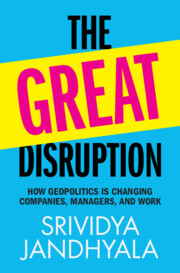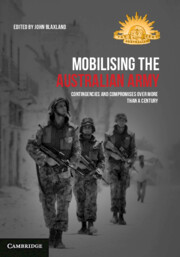Refine search
Actions for selected content:
120 results
9 - National Security
-
-
- Book:
- Explaining the History of American Foreign Relations
- Published online:
- 24 October 2025
- Print publication:
- 13 November 2025, pp 183-203
-
- Chapter
- Export citation
3 - Modernization and Its Discontents: Climate Change, Sociopolitical Reform, and Demographic Anxiety
- from Part I - The Birth of the Petro-State: How Oil Reshaped the Gulf
-
- Book:
- The Gulf's Climate Reckoning
- Published online:
- 13 October 2025
- Print publication:
- 30 October 2025, pp 72-108
-
- Chapter
- Export citation
The competence–control trade-off in military AI innovation: Autonomous weapons systems and shifting modes of state control over private experts
-
- Journal:
- European Journal of International Security , First View
- Published online by Cambridge University Press:
- 29 October 2025, pp. 1-21
-
- Article
-
- You have access
- Open access
- HTML
- Export citation
Coda
-
- Book:
- Security, Fiscal Policy, and Sovereignty in Renaissance English Literature
- Published online:
- 04 September 2025
- Print publication:
- 18 September 2025, pp 203-208
-
- Chapter
- Export citation
Chapter 4 - Sovereignty and Security Dilemmas in William Shakespeare’s History Plays
-
- Book:
- Security, Fiscal Policy, and Sovereignty in Renaissance English Literature
- Published online:
- 04 September 2025
- Print publication:
- 18 September 2025, pp 92-126
-
- Chapter
- Export citation
Truth Telling, Trust, and Just Intelligence Theory
-
- Journal:
- Ethics & International Affairs / Volume 39 / Issue 1 / Spring 2025
- Published online by Cambridge University Press:
- 22 July 2025, pp. 89-101
-
- Article
-
- You have access
- Open access
- HTML
- Export citation
1 - Changing Global Order
-
- Book:
- The Great Disruption
- Published online:
- 05 June 2025
- Print publication:
- 19 June 2025, pp 1-34
-
- Chapter
- Export citation
10 - Looking Ahead
-
- Book:
- The Great Disruption
- Published online:
- 05 June 2025
- Print publication:
- 19 June 2025, pp 253-260
-
- Chapter
- Export citation

The Great Disruption
- How Geopolitics is Changing Companies, Managers, and Work
-
- Published online:
- 05 June 2025
- Print publication:
- 19 June 2025
Introduction
-
-
- Book:
- Mobilising the Australian Army
- Published online:
- 23 May 2025
- Print publication:
- 30 May 2025, pp 1-10
-
- Chapter
- Export citation

Mobilising the Australian Army
- Contingencies and Compromises Over More than a Century
-
- Published online:
- 23 May 2025
- Print publication:
- 30 May 2025
25 - The Enjoyment and Exercise of Rights and Freedoms Regime
- from Title 7 - International Legal Regime of Human Rights and Freedoms
-
- Book:
- International Human Rights Law
- Published online:
- 10 April 2025
- Print publication:
- 01 May 2025, pp 503-536
-
- Chapter
- Export citation
4 - Conscripting Youth for World War II
-
- Book:
- The Age of Youth
- Published online:
- 27 May 2025
- Print publication:
- 24 April 2025, pp 129-160
-
- Chapter
- Export citation
The Cyber Solidarity Act: Framework and Perspectives for the New EU-Wide Cybersecurity Solidarity Mechanism Under the EU Legal System
-
- Journal:
- European Journal of Risk Regulation / Volume 16 / Issue 2 / June 2025
- Published online by Cambridge University Press:
- 11 April 2025, pp. 485-497
-
- Article
-
- You have access
- Open access
- HTML
- Export citation
Rooted in identity, aimed at security: Polish politics towards Ukraine and its ontological security foundation
-
- Journal:
- European Journal of International Security , First View
- Published online by Cambridge University Press:
- 07 April 2025, pp. 1-21
-
- Article
-
- You have access
- Open access
- HTML
- Export citation
Walking a Fine Line: US Involvement in Bilateral Tensions between South Korea and Japan
-
- Journal:
- Journal of East Asian Studies / Volume 24 / Issue 3 / November 2024
- Published online by Cambridge University Press:
- 18 March 2025, pp. 386-407
-
- Article
- Export citation
Case Study 2.3 - TikTok versus United States
- from Section 2 - Compliance
-
-
- Book:
- A Casebook on Chinese Outbound Investment
- Published online:
- 28 February 2025
- Print publication:
- 06 March 2025, pp 113-130
-
- Chapter
-
- You have access
- Open access
- HTML
- Export citation
Critical Raw Materials, the Net-Zero Transition and the ‘Securitization’ of the Trade and Climate Change Mitigation Nexus: Pinpointing Environmental Risks and Charting a New Path for Transnational Decarbonization
-
- Journal:
- World Trade Review / Volume 24 / Issue 2 / May 2025
- Published online by Cambridge University Press:
- 30 January 2025, pp. 237-256
- Print publication:
- May 2025
-
- Article
-
- You have access
- Open access
- HTML
- Export citation
Managed freedom in precarious times: Maintaining academic freedom in transitional Hong Kong
-
- Journal:
- Global Constitutionalism / Volume 14 / Issue 1 / March 2025
- Published online by Cambridge University Press:
- 27 January 2025, pp. 182-205
-
- Article
-
- You have access
- Open access
- HTML
- Export citation
Self-judgment in international law: Between judicialization and pushback
-
- Journal:
- Leiden Journal of International Law / Volume 37 / Issue 4 / December 2024
- Published online by Cambridge University Press:
- 30 September 2024, pp. 915-938
-
- Article
-
- You have access
- Open access
- HTML
- Export citation
